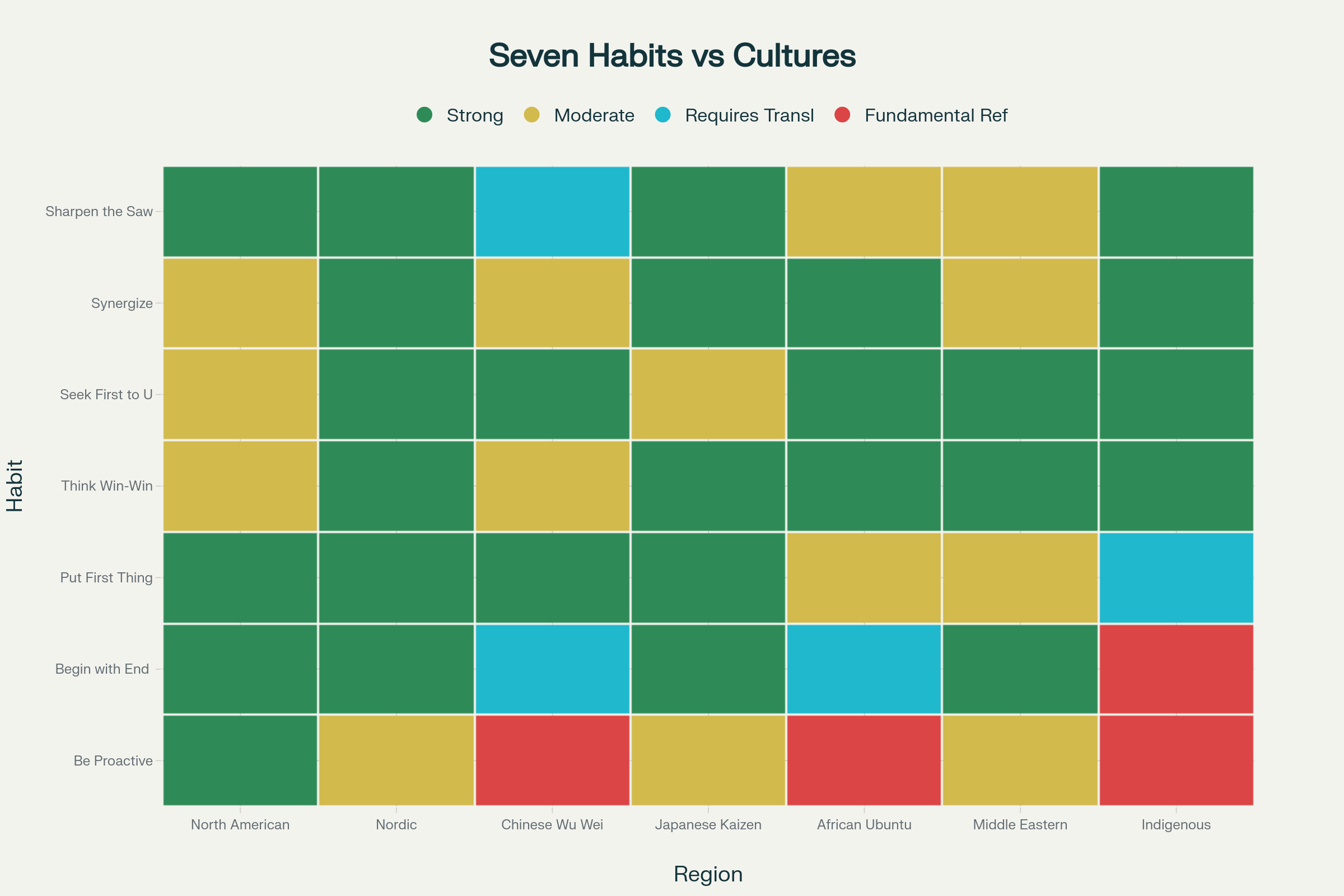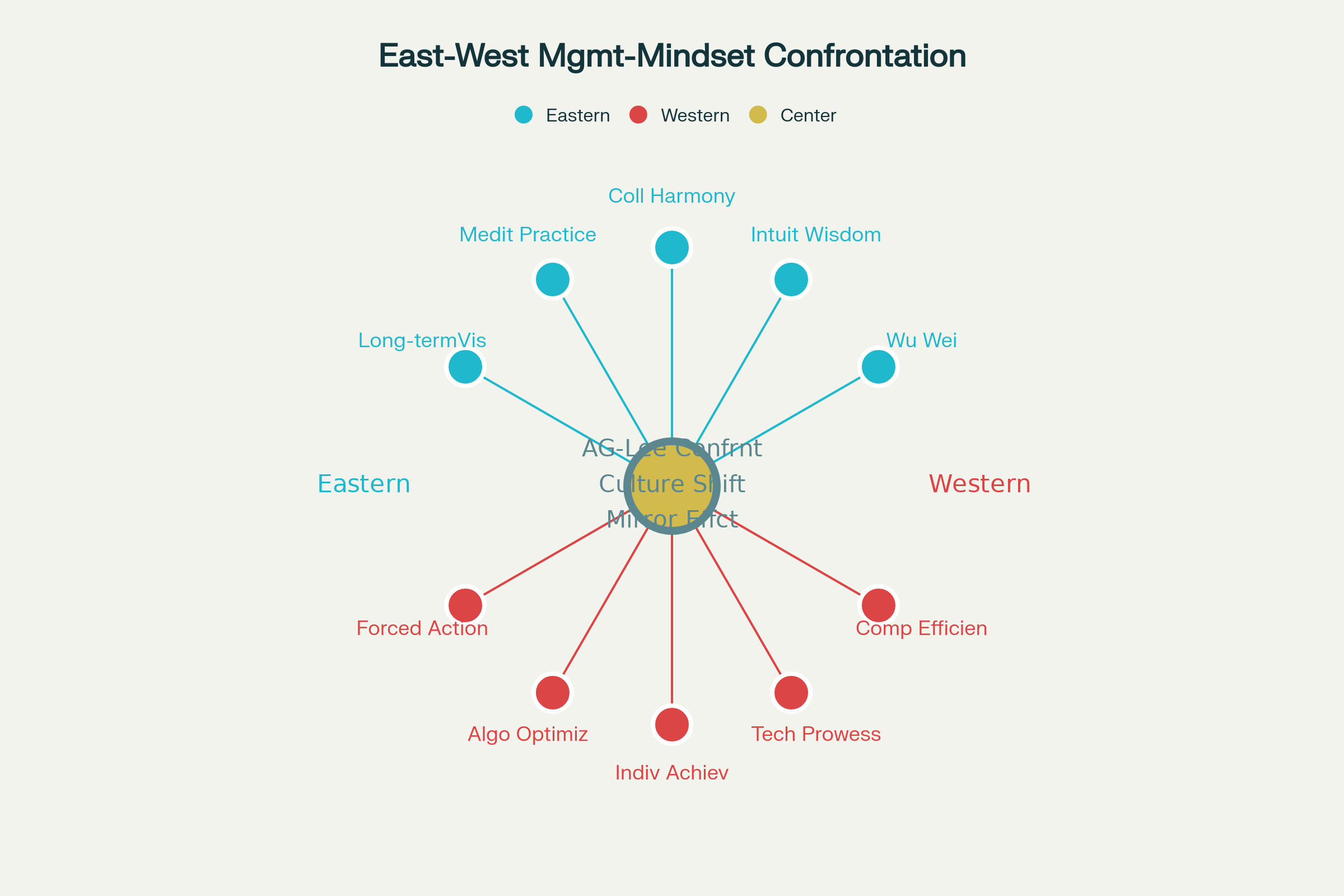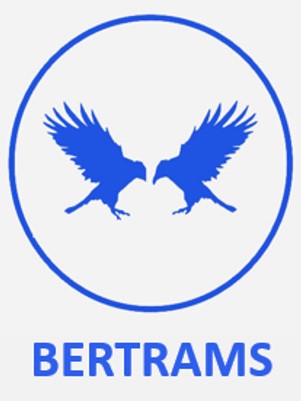Cultural Adaptation in the Mirror of Artificial Intelligence: Transforming Global Management Philosophy Beyond Status Quo Bias
The Great Cultural Transformation: From Defensive Silos to Unified Global Offense
The transformation from defensive, siloed regional mindsets to unified global offensive cultures represents one of the most profound organizational shifts modern enterprises can undertake. This comprehensive analysis examines how the 2016 confrontation between Go grandmaster Lee Sedol and DeepMind’s AlphaGo serves as a cultural watershed that forces a global reckoning with traditional management theories, particularly Stephen Covey’s Seven Habits of Highly Effective People, while exposing the interplay between ancient wisdom traditions and modern computational paradigms.
The AlphaGo-Lee Sedol match transcended mere competition between human and machine, emerging as a spiritual and philosophical confrontation that catalyzed profound questions about survival strategies in an age of machine learning. This event revealed how status quo bias—the cognitive fuel that makes familiar practices feel safer than objectively better alternatives—prevents organizations from achieving authentic cultural transformation.

Cultural Adaptation Matrix: Seven Habits Alignment Across Global Management Philosophies
The Seven Habits in Cultural Translation: Beyond Western Individualism
The Cultural Imperative for Management Theory Adaptation
Stephen Covey’s Seven Habits of Highly Effective People has fundamentally transformed Western leadership philosophy since 1989, yet its true power emerges only when adapted to honor the deep cultural wisdom and historically preserved traditions of different regions. After 500+ years of cultural evolution, each global region has developed unique management philosophies that reflect their fundamental values, decision-making processes, and collective wisdom.
The cultural adaptation matrix reveals fascinating patterns in how different regions naturally align with Covey’s principles. North American individualistic approaches directly align with “Be Proactive” as personal responsibility and achievement-focused action, reflecting the Protestant work ethic evolved into modern entrepreneurship. However, this same habit requires fundamental reframing in Eastern contexts where Wu Wei (effortless action) teaches strategic patience and natural timing rather than forced intervention.
Eastern Philosophy: Wu Wei and the Critique of Forced Action
Chinese Wu Wei represents one of humanity’s most sophisticated management philosophies, teaching leaders to act in accordance with natural patterns rather than forcing outcomes. This 2,500-year-old wisdom directly challenges Western activism with profound effectiveness. In Eastern management philosophy, “Be Proactive” transforms into acting in natural flow rather than aggressive proactivity, emphasizing responsive action over forcing solutions.
The concept of Wu Wei critiques deliberate, contrived action (youwei), which often stems from human desire, ambition, and ego. This philosophy demonstrates that true efficacy arises not from forceful intervention but from effortless alignment with the natural rhythms of life—a stark contrast to Western management’s emphasis on control and optimization.
African Ubuntu: Redefining Individual Effectiveness
Ubuntu represents perhaps the most profound cultural adaptation, fundamentally redefining individual effectiveness as collective responsibility. This philosophy challenges Western individualism with community-centered wisdom that has sustained African societies for millennia. Under Ubuntu, “I am because we are”—proactivity serves community needs rather than individual achievement, and synergy creates exponential community power that amplifies individual contributions.
The Ubuntu approach to the Seven Habits demonstrates that community prosperity benefits all, creating “1+1=3” outcomes through collective wisdom and shared responsibility. This represents a fundamental shift from Western win-win thinking to collective prosperity models that prioritize long-term bonds over short-term efficiency.
The AlphaGo Mirror: Consciousness, Creativity, and Cultural Assumptions
The Spiritual Battleground of Go
The 2016 AlphaGo match exposed the limits of human attachment to outcomes—a core Buddhist teaching. Lee Sedol’s post-match reflections revealed existential anguish: “I felt powerless…like all my training was meaningless”. AlphaGo’s victory demonstrated anicca (impermanence), dissolving the permanence of human mastery while forcing a confrontation with cognitive limitations.
Go embodies principles of wu wei and harmony with natural patterns. Masters like Lee Sedol cultivated strategies through decades of meditative practice, aligning moves with the game’s cosmic balance rather than brute-force calculation. The 19×19 grid became a Taoist landscape where players navigated yin-yang tensions between territory and influence, mirroring the Daoist concept of complementary opposites.
AlphaGo’s unorthodox Move 37 in Game 2 shattered these expectations, deploying a stone placement no human master would consider—a radical departure from 2,500 years of accumulated wisdom. This moment revealed how machine learning algorithms could bypass traditional heuristic frameworks, creating novel patterns that challenged the very notion of “natural” gameplay.
Cultural Responses: East Meets West
Research into media coverage reveals significant cultural differences in interpreting AlphaGo’s victory. Chinese press acknowledged the impact on assumptions about humanity and Go but overall did not assess this as a danger, possibly due to different cultural backgrounds and less apocalyptic traditions compared to Western Christianity. Western media predominantly framed the match as “man vs. machine,” emphasizing threat narratives and technological dominance.
The match triggered a global cognitive dissonance, with Go professionals reporting identity crises akin to spiritual awakenings. Lee Sedol’s retirement in 2019 symbolized this ego death, stating “I realized my understanding of Go was fundamentally incomplete”. This mirrors the Buddhist sunyata (emptiness) experience, where fixed concepts dissolve into fluid awareness.

Philosophical Confrontation: Eastern Wu Wei vs Western Optimization in the AlphaGo Era
The Mirror Effect: AI as Reflection of Human Consciousness
AlphaGo acted as a technological koan, forcing players to confront cognitive limitations. The match highlighted complementary strengths between Eastern and Western approaches: Eastern intuitive pattern recognition combined with Western computational tree search creates human-AI collaborative analysis that transcends either approach alone.
This mirroring effect accelerates what Teilhard de Chardin termed the “noosphere”—the collective mind’s evolution through technological interaction. AI serves as a mirror of human consciousness, reflecting not just our capabilities but our assumptions about intelligence, creativity, and the nature of conscious experience.
Status Quo Bias: The Defensive Mindset Barrier
Cultural Manifestations of Resistance
Status quo bias—the tendency to prefer things to remain the same by resisting change—manifests differently across cultures. This cognitive bias makes familiar practices feel safer than objectively better alternatives, creating defensive cultural mindsets that protect existing ways of operating even when transformation would provide substantial benefits.
The bias operates through several mechanisms that prevent cultural transformation: numeric anchoring (focusing on costs rather than value), illusory truth effect (believing change is inherently difficult), and confirmation bias (interpreting information to confirm existing preconceptions). These biases are particularly powerful in hierarchical cultures where authority and tradition are deeply respected.
From Defense to Offense: The Mindset Transformation
The shift from defensive to offensive mindset requires recognizing that defensive postures foster agility to outmaneuver challenges while rejecting protectionism in favor of calculated, intelligent risk-taking. An offensive mindset is characterized by being proactive, opportunistic, and future-focused rather than reactive or complacent.
Organizations must cultivate offensive innovativeness by challenging each other to think entrepreneurially, fostering environments where diverse perspectives flourish, and purposefully developing an offensive mindset that raises the entire organization’s level of innovation. This transformation is particularly crucial for global companies navigating cultural adaptation across diverse markets.
The Path Forward: Cultural Hybridity and Conscious Evolution
Synthesis of Eastern and Western Wisdom Traditions
The future of global management lies not in standardization but in synthesis—learning from Chinese Wu Wei’s strategic patience, Ubuntu’s community prosperity, Nordic consensus democracy, and Indigenous seven-generation thinking. Each culture holds pieces of a larger truth about human effectiveness, and global leaders must become fluent in multiple cultural management languages.
The confrontation between Eastern and Western approaches in the AlphaGo match offers guidance for this synthesis:
Humility Through Mirroring: Use AI and cultural encounters to expose cognitive blind spots while preserving ethical agency. Adaptive Fluidity: Combine Eastern acceptance with Western innovation in dynamic balance. Conscious Evolution: Leverage technological and cultural intelligence to deepen spiritual and philosophical inquiry rather than replace it.
Toward the Second Axial Age
The Lee Sedol-AlphaGo confrontation marks a pivotal moment in what philosopher Karl Jaspers termed the “Second Axial Age”—a global synthesis of wisdom traditions accelerated by technological change. As humanity faces existential challenges from climate change to AI governance, the match’s lessons offer guidance for authentic cultural adaptation.
Effective global management requires cultural humility—recognizing that every region’s historically preserved wisdom offers essential insights for contemporary challenges. The Seven Habits provide a common framework, but their true power emerges through the cultural wisdom that each society brings to their interpretation and implementation.
The Go board’s 361 intersections now symbolize humanity’s infinite adaptive possibilities when traditional wisdom engages with artificial minds. As Lee Sedol reflected: “AlphaGo taught me that even defeat can be a teacher”. In this light, the human-machine confrontation becomes not a threat, but a gateway to unprecedented collective awakening—a digital sangha where silicon and synapse collaborate to map consciousness’s uncharted territories.
Conclusion: Beyond the Status Quo
The transformation from defensive, siloed mindsets to unified global offensive cultures requires more than implementing new tools or adopting modern technology. It demands a fundamental shift in how we understand cultural adaptation, moving beyond the status quo bias that keeps organizations trapped in familiar but limiting patterns.
The AlphaGo moment serves as a powerful metaphor for this transformation: just as Lee Sedol’s encounter with artificial intelligence forced a reckoning with assumptions about human intelligence and creativity, organizations must confront their own assumptions about cultural adaptation and management philosophy. The path forward requires embracing cultural hybridity—not the dominance of one approach over another, but the conscious integration of diverse wisdom traditions into new forms of collective intelligence.
As we navigate an increasingly complex global landscape, the choice is clear: remain defensive and protect outdated certainties, or embrace an offensive mindset that honors cultural diversity while building unified purpose. The future belongs to organizations that can synthesize Eastern wu wei with Western optimization, Ubuntu community wisdom with Nordic consensus, and Indigenous seven-generation thinking with contemporary innovation—creating new models of conscious, culturally adaptive leadership for the challenges ahead.
